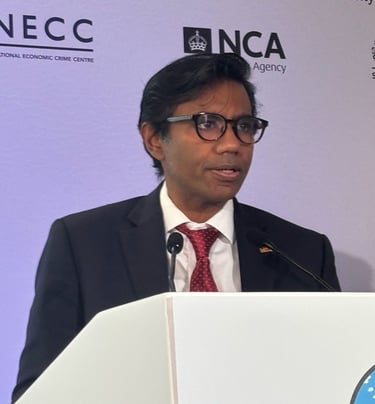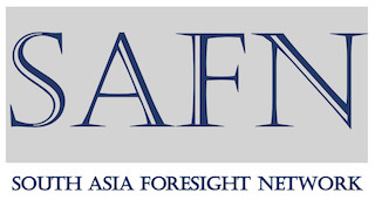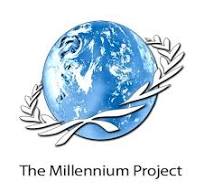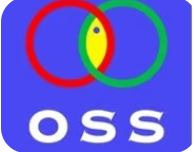Abeyagoonasekera Highlights Sri Lanka’s Progress in Anti-Corruption and Cross-Border Crime Enforcement at Cambridge Symposium
Nearly sixty politicians, officials, and associates have been arrested on corruption charges in the past six months—marking a sharp departure from the country’s long history of impunity. He praised President AKD’s commitment to judicial independence, declaring, “No one, not even a president, is above the law.”
NEWS
SAFN
9/3/2025
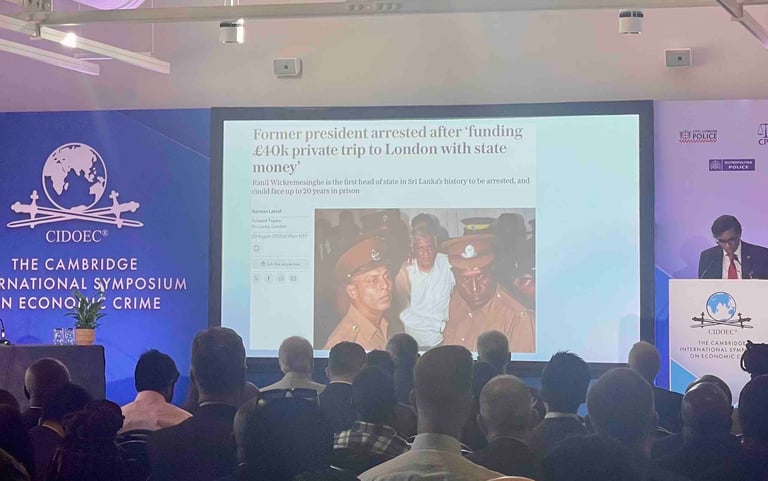

(Pic: Asanga Abeyagoonasekera speaking at the Cambridge Economic Crime Symposium)
Cambridge, UK – September 3, 2025 – Asanga Abeyagoonasekera, Executive Director of the South Asia Foresight Network (SAFN), under the Millennium Project in Washington, D.C., addressed the 42nd International Symposium on Economic Crime at the University of Cambridge on September 2, spotlighting Sri Lanka’s recent advances in judicial independence, anti-corruption reforms, and international cooperation against organized crime.
In his keynote “Borders, Shadows of Geopolitics, and the Grey Economy in South Asia and Southeast Asia: Confronting Economic Crime in a Fragmented World,” Abeyagoonasekera noted that Sri Lanka is undergoing a rare moment of accountability. Nearly sixty politicians, officials, and associates have been arrested on corruption charges in the past six months—marking a sharp departure from the country’s long history of impunity. He praised President Anura Kumara Dissanayake’s commitment to judicial independence, declaring, “No one, not even a president, is above the law.”
He stressed that the arrest of former President Ranil Wickremesinghe shows the law is being applied equally, regardless of position or privilege. Similarly, the capture of Sri Lankan underworld leaders in Indonesia demonstrates a new level of cross-border law enforcement success achieved through close cooperation between Sri Lankan and Indonesian police and law enforcement authorities.
Abeyagoonasekera also warned of growing risks from Sri Lanka’s grey economy, including large-scale casinos and online gambling, which could fuel money laundering if left unchecked. Placing these issues in a wider regional context, he urged South Asian and Southeast Asian states to adopt stronger tools such as the UK’s Unexplained Wealth Orders (UWOs) and deepen cross-border cooperation to tackle drug trafficking, human smuggling, terrorism financing, and corruption. He reminded that the IMF, in the wake of Sri Lanka’s economic collapse, recommended establishing an independent prosecution office—but cautioned that without resources and sustained global support, such reforms remain fragile.
Abeyagoonasekera, who also serves as Regional Director of the Millennium Project in Washington, D.C., announced his forthcoming book Winds of Change (World Scientific, Singapore), which examines how corruption, domestic politics, and geopolitical pressures intersect to undermine governance in fragile states. Drawing from his work with the IMF’s Governance Diagnostic, he stressed that political instability, corruption, and conflict continue to feed each other across the region.
“Economic crime thrives on fragmentation,” he concluded. “But fragmentation does not mean failure. If we strengthen institutions, build cooperation across borders, and confront the geopolitical dimensions of crime, we can move from reaction to prevention.”
